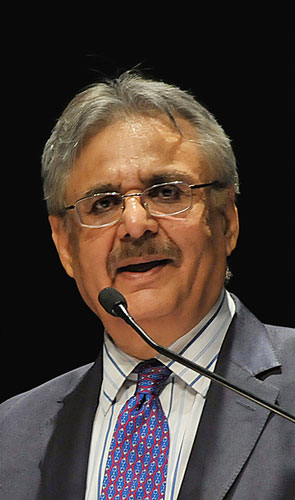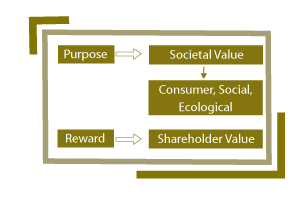
|
I am delighted to present ITC's sixth Sustainability Report.
This Report is an expression of ITC's abiding commitment to contribute to building a sustainable, secure and inclusive future for India. A commitment that is manifest in our efforts to achieve higher levels of Triple Bottom Line performance measured in terms of our contribution to augmenting economic, environmental and societal capital.
This Report, a transparent and voluntary disclosure of ITC's sustainability endeavours, is independently assured by M/s Ernst & Young and conforms to the stringent 'G3' guidelines of the Global Reporting Initiative (GRI) at the highest 'A+' level.
As the world begins to sight the beginnings of a recovery from the deep crisis perpetuated by a global financial disaster, countries and corporations across the world are introspecting beyond the immediate causes to examine the fundamental vulnerability of economic systems prevalent over decades. It is increasingly being realised that the race for global economic strength and the resultant obsession with faster and higher growth has created a world of huge inequities with utter disregard for sustainability. Progressively degrading environments and inequitous social structures seriously threaten the future of mankind. Exacerbating these challenges today is the new danger posed by global warming and climate change. More than 4 billion people, comprising two-thirds of the world's population, live in poor nations and bear the severest brunt of these environmental and societal imbalances. India, despite its progress on many fronts, mirrors these challenges as a developing nation with large numbers of people living at the margin. |
|
Businesses as an integral organ of society possess enormous strengths that enable them to contribute impactfully to sustainable and inclusive development. At ITC, we believe that businesses exist to subserve larger societal goals. Therefore, their contribution is best measured and judged in terms of the total value they create for society, namely wealth creation that goes beyond traditional profit and loss statements to encompass a much larger contribution to sustainable development. Sustainability Reporting seeks to encourage voluntary disclosure of such societal contribution by corporates, enabling discerning stakeholders and civil society to better appreciate and support such responsible corporations.
 Free market economies and their corporate strategies have so far been driven by a uni-dimensional purpose of shareholder value creation. To my mind, Shareholder Value ought to be a reward for Societal Value creation. This definition of wealth creation demands a commitment that goes far beyond the market. Committed corporates create total societal value by serving their consumers through competitively superior value propositions, by protecting and nurturing the environment and by innovating strategies that maximise sustainable livelihood creation. This Triple Bottom Line approach to creating larger ‘stakeholder’ value, as opposed to the uni-dimensional pursuit of ‘shareholder’ value, is crucially necessary to ensure the perpetual sustainability of our planet. Free market economies and their corporate strategies have so far been driven by a uni-dimensional purpose of shareholder value creation. To my mind, Shareholder Value ought to be a reward for Societal Value creation. This definition of wealth creation demands a commitment that goes far beyond the market. Committed corporates create total societal value by serving their consumers through competitively superior value propositions, by protecting and nurturing the environment and by innovating strategies that maximise sustainable livelihood creation. This Triple Bottom Line approach to creating larger ‘stakeholder’ value, as opposed to the uni-dimensional pursuit of ‘shareholder’ value, is crucially necessary to ensure the perpetual sustainability of our planet.
Inspired by the overarching vision of making a contribution to the national goals of sustainable development and inclusive growth, ITC has innovatively crafted unique business models that synergise long term shareholder value creation with enhancing societal capital. ITC's globally acknowledged e-Choupal initiative is one such example. Its customised extension and information services empower small and marginal farmers through sustainable agricultural practices that enhance farm productivity and raise rural incomes. Currently, e-Choupals cover 40,000 villages and benefit over 4 million farmers, while providing a unique source of competitiveness to ITC's agri-product sourcing. Similarly, our Social and Farm Forestry initiative, driven by an extensive research based clonal propagation programme, has greened nearly 96,000 hectares and created cumulative employment of 43 million person-days. These plantations provide a reliable source of wood pulp to secure the long-term competitiveness and sustainability of our Paper business. ITC's sustainable forestry practices have earned for it this year the membership of the Global Forest Trade Network of the WWF based on a rigorous process
of qualification.
ITC continues to invest in 'Mission Sunehra Kal', its prime vehicle for implementing social development initiatives, to facilitate sustainable livelihood creation through identified areas of intervention, namely, (i) natural resource management, which includes wasteland, watershed and agriculture development; (ii) genetic improvement in livestock; (iii) economic empowerment of women; and (iv) community development, with focus on primary education, health and sanitation. Our deep engagement with rural communities has enabled us to contribute to the creation of sustainable livelihoods by building community assets. ITC's Integrated Watershed Development initiative has helped create freshwater potential covering over 46,000 hectares in water-stressed areas. In addition, the Company's integrated animal husbandry services have reached out to over 3,00,000 milch animals creating avenues for non-farm based livelihoods. Nearly 2,00,000 children have benefited from our rural supplementary education centres, and 20,000 women entrepreneurs have been created through 1300 self-help groups.
We believe that these efforts to improve the quality of life of rural communities, particularly women and children, will contribute to achieving many of the Millennium Development Goals enunciated by the United Nations. ITC takes pride in its association with the United Nations Global Compact, the world's largest global corporate citizenship initiative. I am happy to state that our initiatives and practices support the principles underlying the Global Compact.
It is also a matter of great satisfaction that ITC's aspiration to be an exemplar in sustainability practices is today manifest in its status as the only company in the world, of its size and diversity, to be 'carbon positive', 'water positive' and 'solid waste recycling positive'. In addition, our businesses have created sustainable livelihoods for more than 5 million people, a majority of whom represent the poorest in rural India. Completing the Triple Bottom Line performance is ITC's foremost position in terms of efficiency in servicing financial capital. Total Shareholder Returns, measured in terms of increase in market capitalisation and dividends, have clocked an annual compound rate of growth of 24% over the past 5 years.
At ITC, we believe that our aggressive pursuit of the sustainability agenda is an investment for the future. These are impactful initiatives that will continue to create enduring value for all our stakeholders. Even as the world grapples with new challenges like global warming, ITC feels reassured that its conscious decision to adopt a low-carbon growth strategy will significantly secure its future competitiveness (for more details, please refer to Chairman's address at the AGM 2009 available at www.itcportal.com). Eight Clean Development Mechanism (CDM) projects have already been registered under the Kyoto Protocol of the UNFCCC. We are also progressively investing in renewable energy, and have achieved international benchmarks in specific energy consumption. Substantial investments are being made in cutting edge Research & Development, particularly in areas like agri sciences which will significantly enhance the future competitiveness of ITC's diversified businesses.
The Company's rich lineage in branding, trade marketing and distribution, based on deep consumer insights, is supported by world-class manufacturing practices and outstanding human capital to continuously create superior value for all its stakeholders.
As a responsible corporate citizen, we pay utmost attention to issues such as corporate ethics, transparency and sustainability. The Code of Corporate Governance in ITC is based on the abiding principles of trusteeship, transparency, empowerment and accountability, control and ethical corporate citizenship. We believe in setting exemplary standards of ethical behaviour, both internally within the organisation, as well as in external relationships. This year, a new sub-committee of the Board has been created to provide strategic guidance to strengthen the Company's sustainability practices. ITC together with the Confederation of Indian Industry has set up the CII-ITC Centre of Excellence for Sustainable Development to promote sustainability practices amongst a larger universe of corporates. The Centre has been able to mobilize significant action amongst a large section of business and industry. It has also instituted Awards to recognise such efforts.
I believe that in the years ahead sustainable business practices will emerge as a distinct source of competitiveness of firms as stakeholders demand an increasing level of contribution to societal goals. This phenomenon will start to become increasingly visible post the Copenhagen Conference on climate change scheduled for later this year. ITC has already gained momentum in that direction by embedding larger sustainability goals in its business strategies to lay the foundation for a more secure and sustainable future. This strong foundation will enable us to create enduring Stakeholder Value for generations to come.
ITC's sustainability journey has inspired us to renew our commitment to consciously direct the collective endeavours of our employees across all businesses, functions and locations to continuously improve sustainability practices to ultimately attain and exceed global standards.
Prime Minister Manmohan Singh's vision for sustainable development with social equity through effective public-private partnerships continues to inspire ITC's sustainability philosophy. I have great pleasure in dedicating this Report to that abiding vision.
(Y C DEVESHWAR)
Chairman
September 2009 |

